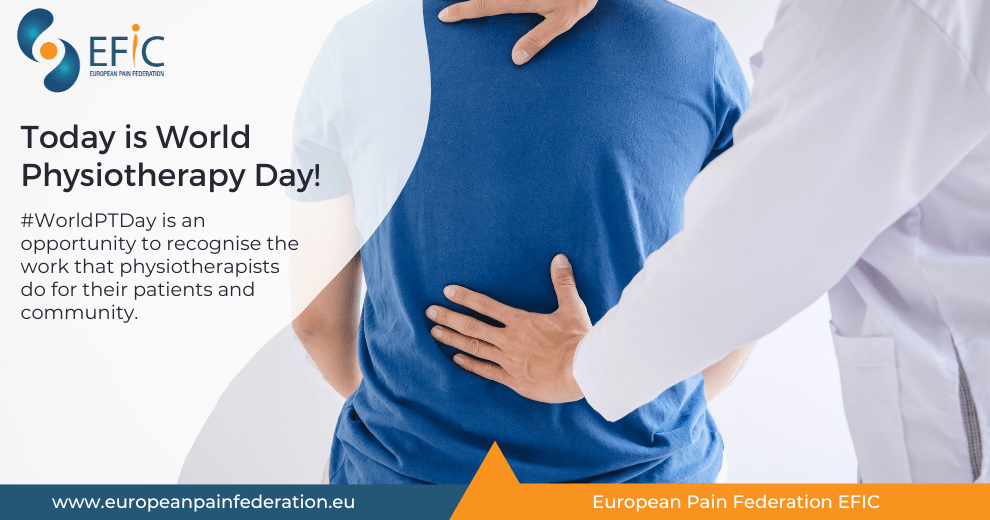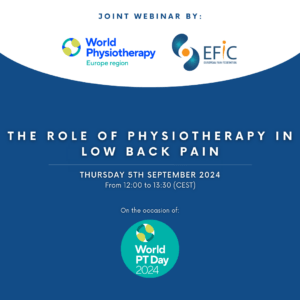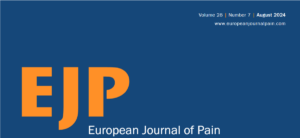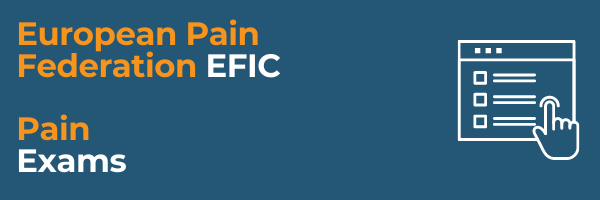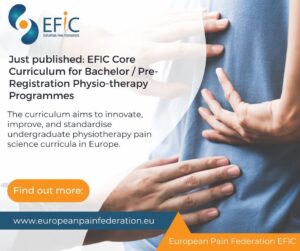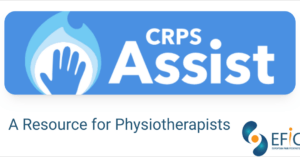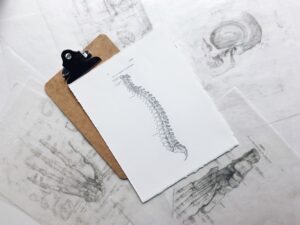Every year on 8 September, #WorldPTDay is a moment of reflection and awareness of the challenges physiotherapists face daily. Moreover, it is an occasion to highlight the necessary steps to allow physiotherapists worldwide to deliver the best patient care.
This year’s theme is “Low back pain – a global epidemic“.
Chronic Low back pain (LBP) implies widespread work loss and reduced quality of life around the world, with estimates that depict 619 million people living with LBP in 2020 and expect to reach 843 million by 2050 (The Lancet Rheumatology, June 2023). This phenomenon is most prevalent in working-age individuals (20-65 years), resulting in higher absenteeism, lower productivity, and earlier retirements. All the costs linked to LBP are estimated to impact between 0,1% and 2% of gross domestic product in European countries (IASP, July 2021).
World Health Organisation advises personalised treatment of LBP, adopting a biopsychosocial perspective (WHO, June 2023). The concrete application of this recommendation consists of the following:
- educational programmes disseminating knowledge and self-care strategies;
- physical activity routines;
- combinations of physiotherapy, psychological, and pharmacological interventions.
For more information and to access the wonderful resources relating to World PT Day, visit https://world.physio/wptday
Please allow us to highlight some of EFIC’s resources relevant to physiotherapists:
On the occasion of World Physiotherapy Day, EFIC and the Europe Region of World Physiotherapy are holding a joint webinar on this year’s topic: Low Back Pain. The event, on 5 September 2024, from 12.00 to 13.30 CET, will feature expert physiotherapists in pain management who will share the latest evidence in the treatment of Low Back Pain.
Register here
Deepen your knowledge of LBP with these recent EJP articles:
- Exploring the association between patient-drawn pain diagrams and psychological and physical health variables: A large-scale study of patients with low back pain: https://onlinelibrary.wiley.com/doi/10.1002/ejp.4711
- Trajectories of opioid use among patients with low back pain: Association to work absence: https://onlinelibrary.wiley.com/doi/10.1002/ejp.4706
- Primary care seeking among adults with chronic neck and low back pain in Norway: A prospective study from the HUNT study linked to Norwegian primary healthcare registry: https://onlinelibrary.wiley.com/doi/10.1002/ejp.2310
Physiotherapists interested in keeping up to date with the most contemporary research on pain should complete joining the EFIC Academy. This would give you free access to the EFIC Academy Education Platform.
Our Platform includes tailored material to the Physiotherapy curriculum, developed by leading European physiotherapy educators specifically for an online learning environment in mind. Learners can pursue self-directed learning or follow specific tracks relevant to their needs.
Join EFIC Academy here
Physiotherapists interested in upskilling in contemporary pain assessment and treatment can complete the European Pain Federation Diploma in Pain Physiotherapy (EDPP). The EDPP is open to all qualified physiotherapists who see and treat people with pain, including those qualified to work in a hospital setting, assisting patients with rehabilitation following illness.
The next virtual sitting of EDPP Part 1 will take place on 15 November 2024.
Registrations are open, deadline: 15 October 2024
Register here
EFIC developed its core pain curriculum for Bachelor/pre-registration physiotherapy programs. The project was initiated through the Erasmus+ funded Physiotherapy Pain Science Curriculum Augmentation (UPPScAle) project, led by Brona Fullen (Ireland) and Harriet Wittink (The Netherlands), along with Ligia Rusu (Romania), Snjezana Schuster (Croatia), and Alan Kacin (Slovenia).
A subsequent collaboration between the European Pain Federation EFIC and the European Network of Physiotherapy in Higher Education (ENPHE) led to the development of the EFIC core pain curriculum for Bachelor/pre-registration Physiotherapy programs. Standardising physiotherapy education will ensure graduates become competent and proficient healthcare professionals, equipped to address the complexities of pain within diverse healthcare settings.
Find out more here
CRPS Assist is a free online tool for all European physiotherapists, providing practical guidance about Complex Regional Pain Syndrome (CRPS). As a relatively rare condition, most physiotherapists see a patient with CRPS only occasionally during their career and, therefore, will have limited experience and expertise. Further, patients with chronic CRPS repeatedly report difficulty getting a diagnosis and accessing treatment.
This tool aims to help patients with CRPS access the care they deserve as quickly as possible wherever they live. CRPS Assist can help clinicians identify CRPS patients and guide them through the following steps, highlighting common pitfalls and providing practical tips. It also includes a downloadable Budapest diagnostic criteria form and is available in many European languages.
Learn more here
The Low Back Pain Curriculum Content Standards (LBP-CCS) have been designed for academic programs that provide entry-level education for healthcare professionals.
The standards aim to guide the development or review of curriculum content related to the management of low back pain in primary care. Appropriate LBP curriculum content within entry-level clinical training programs is needed to ensure that healthcare professionals graduate with the knowledge and skills required to deliver high-quality, evidence-based care in clinical practice.
The LBP-CCS were developed by a team of academics, clinicians, consumers, and researchers, including representatives from 11 countries and across various healthcare professions.
The endorses of the LBP-CCS include: European Pain Federation EFIC; World Physiotherapy; The International Society for the Study of the Lumbar Spine; Australia & New Zealand Musculoskeletal Clinical Trials Network (ANZMUSC); Australia & New Zealand Low Back Research Network (ANZBACK).
You can download the LBP-CCS here
